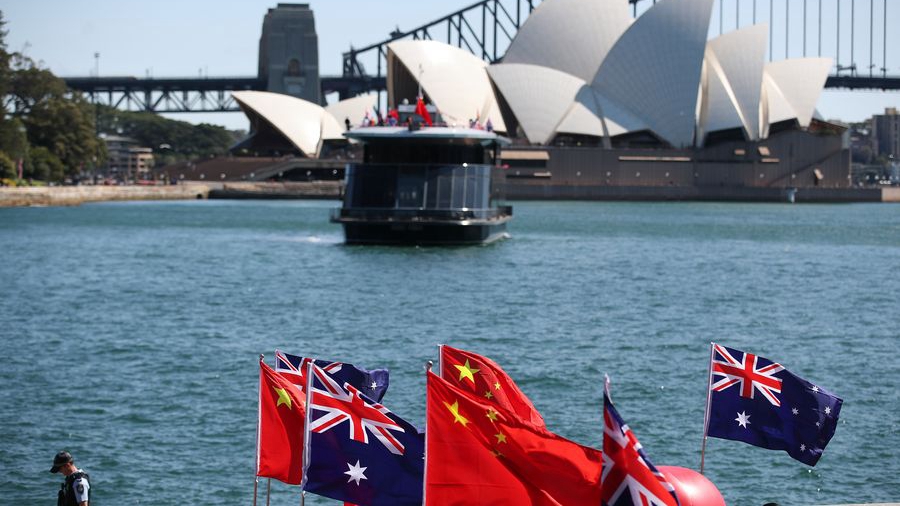Pact reflects growing interest in common security
By Karl Wilson | China Daily Global | Updated: 2022-04-28 09:47

It is hard to take seriously the reaction that has been whipped up following the signing of a security agreement between China and the Solomon Islands on April 19. While the pact exemplifies China's initiative for common security, much of related US and Australian hype is pure speculation at best and borders on the hysterical.
The hawks in Canberra and Washington have worked themselves into a frenzy over the agreement-one between two sovereign nations that want to cement economic ties and friendship. They seem to have ignored for too long the vision of a global community for shared future raised by President Xi Jinping.
China is committed to the vision of common, comprehensive, cooperative and sustainable security, Xi has said on several international occasions, most recently on April 21 in his keynote address to the annual conference of the Boao Forum for Asia.
At the forum, Xi proposed that the international community should examine the possibility of establishing a Global Security Initiative to ease tensions between nations. Xi said that such an initiative would be "committed to respecting the sovereignty and territorial integrity of all countries, uphold noninterference in internal affairs, and respect the independent choices of development paths and social systems made by people in different countries".
Though a small country of just under 700,000 people, Solomon Islands has the full right under international law to make its own choices for security and development, not to mention that it reached a security agreement with Australia years ago.
Its security pact with China is the latest example of two sovereign states being unjustly scrutinized and criticized for seeking closer ties and friendship.
The right-wing media in Australia has fallen over itself to spread fear and anxiety without due care for the wider Pacific region, which simply wants to live in peace in an uncertain world. Australian Defence Minister Peter Dutton has suggested that the Solomon Islands government may have been bribed into signing the agreement, while Deputy Prime Minister Barnaby Joyce said Australia risked having its "own little Cuba off the coast "because of the agreement.
Then came the armchair analysts, who said we can expect to see a flotilla of (Chinese) naval ships, aircraft and troops heading to the Solomons in weeks or months. Really?
This sort of rhetoric does nothing to help the people of the Solomon Islands or the Pacific, nor will it help Australians. Instead, it falls into the Cold War sphere that China has warned against.
Solomon Islands Prime Minister Manasseh Sogavare has gone to great pains to refute claims that China is about to build a naval base and station troops in the country.
Australians should remember that the Solomon Islands asked Australia to build a naval base not long ago, but the request was rejected, as Canberra cited defense commitments with Papua New Guinea, a former Australian colony.
Like most state leaders in the world, Sogavare told his country's Parliament recently that "we have no intention of pitching into any geopolitical power struggle", and that "we will not pick sides".
Unlike those in Australia and the United States who project China as a threat, many others see China as offering opportunities for growth and as a reliable partner on issues of common concern.
The Solomon Islands, an archipelago nation to the east of Papua New Guinea, is in great need of sustainable development.
According to the United Nations Educational, Scientific and Cultural Organization, the country has an adult literacy rate of 76.6 percent. The Asian Development Bank says 22.7 percent of the population live below the poverty line.
So why shouldn't China, the world's second-biggest economy, help the Solomon Islands grow and prosper?
That is all Sogavare seeks. And as leader of a sovereign nation, he must be respected for that and not dictated to by bigger nations bent on dragging the Pacific into a new Cold War with China.
Most Solomon Islands people work in subsistence farming, fishing and artisanal forestry. If China is willing to help the government of the Solomon Islands improve the lives of its people, why is that a problem for rich, powerful countries like Australia and the United States?
Australia plans to spend A$65 million ($46.4 million) to build a new High Commission in Honiara, the capital of Solomon Islands. Why did it not use that money to improve the quality of life for people in the country?
As Xi said in expounding the Global Security Initiative, countries should abide by the purposes and principles of the UN Charter, reject Cold War mentality, oppose unilateralism and say no to group politics and bloc confrontation.
In today's new world, nations, big or small, hold their future and destiny in their own hands. They can pick and choose whom they do business with.
The author is a China Daily correspondent based in Sydney.
























